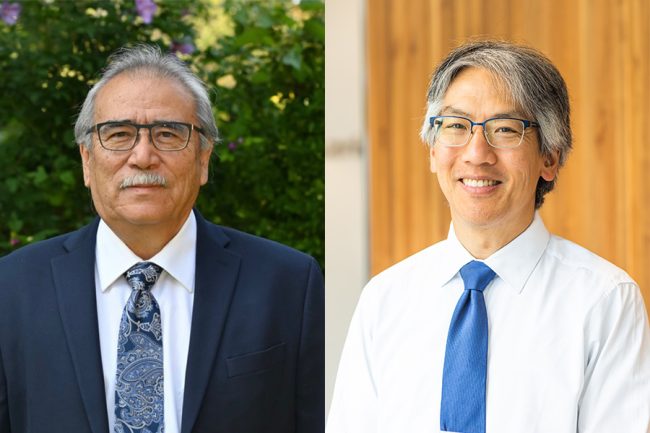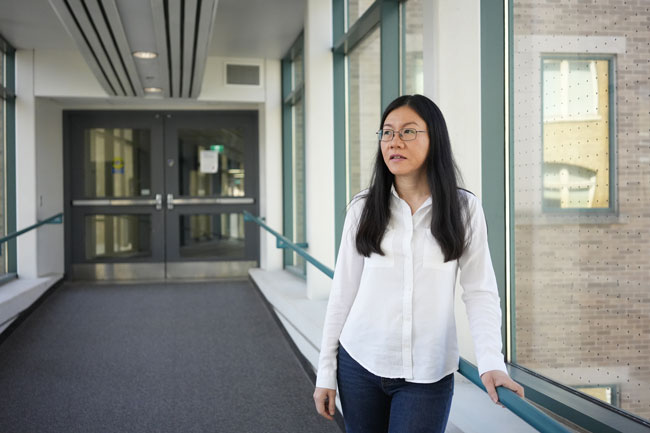
SEPTEMBER 11, 2023 • By Carolyn Farrell
U of T Engineering professors Alberto Leon-Garcia (ECE) and Tom Chau (BME) have been elected fellows of the Royal Society of Canada (RSC) based on exceptional contributions to scholarship in their fields.
The RSC’s mission is to recognize scholarly, research and artistic excellence, to advise governments and organizations, and to promote a culture of knowledge and innovation in Canada. Fellowship in the RSC is one of the highest honours a Canadian scholar can achieve.
“Professors Leon-Garcia and Chau are visionary researchers whose contributions have advanced their fields tremendously,” says Christopher Yip, Dean of U of T Engineering.
“Their innovative work in multi-service networks and pediatric rehabilitation technologies, respectively, are outstanding examples of the world-leading research underway at U of T Engineering.”
Leon-Garcia’s research has facilitated the evolution of modern telecommunications technologies, helping telecommunications evolve into today’s multiservice networks and laying the foundation for future smart infrastructure.
For more than 40 years, Leon-Garcia’s research has focused on one fundamental problem: how best to allocate network resources to meet the varying demands of users. Global-scale networks such as the internet resemble transportation networks, with road segments converging at interchanges; or ‘packet switches,’ where traffic is routed towards its destination.
Leon-Garcia has made significant contributions to the modelling, design and implementation of today’s large-scale switches. His prototypes validated virtualization methods for automated management of software-defined massive-scale infrastructures such as power grids, and his efficient and scalable analytics pipelines are enhancing security and stability in the ‘Internet of Things,’ network operations and cyberspace.
In 2010, Leon-Garcia established the Smart Applications on Virtual Infrastructure (SAVI) research testbed, a partnership of Canadian industry, academia and high-performance computing centres creating solutions for future internet applications. Research conducted through the SAVI testbed previewed concepts that are now integral to today’s 5G networks and will inform 6G networks and beyond.
Leon-Garcia is a Fellow of the American Association for the Advancement of Science, the Engineering Institute of Canada (EIC) and the Canadian Academy of Engineering, and Life Fellow of the Institute of Electrical and Electronics Engineers (IEEE).
He has received many awards include the EIC Julian C. Smith Medal, the RSC Thomas W. Eadie Medal, and the IEEE Canada A.G.L. McNaughton Gold Medal.
“Professor Leon-Garcia has been an influential international leader in the field of computer and communication networks, both in terms of research and education,” says ECE Chair Professor Deepa Kundur. “Moreover, his vision and insight have set the international stage for development, implementation and application in the field. Congratulations to him on this prestigious recognition.”
Professor Chau has transformed the field of pediatric rehabilitation, most notably through his contributions to the development of non-invasive brain-computer interfaces (BCIs) and the establishment of the world’s first pediatric BCI clinic.
BCIs detect and interpret brain activity associated with a user’s intentions, allowing individuals to communicate and control devices with their minds, without the need for any motor control. Chau’s lab has introduced more than a dozen new paradigms for brain-machine interaction, including visuo-spatial imagery, whereby an individual imagines a flashing arrow moving in a specific direction to move an object (for example, a wheelchair).
Other access technologies introduced by Chau’s team over the years include facial thermal imaging that sensitively detects subtle orofacial gestures and emotional states; a vocal classifier that can decode keywords in otherwise unintelligible speech; algorithms that decipher intention-related fluctuations in cardiac rhythms; and brain-computer interfaces for children without functional vision.
Chau has also developed the Hummingbird device, which uses an accelerometer to detect vibrations of the vocal folds to enable communication. These access technologies (among others) have enabled many of his research participants to communicate for the first time, significantly improving their quality of life and allowing them to meaningfully participate in their community.
Chau’s advances in pediatric rehabilitation technology and practice, along with his leadership in reconceptualizing what is possible for severely disabled children, have been recognized with the Governor General’s Innovation Award, the Governor General’s Meritorious Service Cross and induction into the Order of Ontario.
Story from U of T Engineering News, with files from Matthew Tierney


